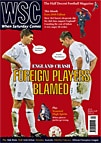 Oleguer Presas is not Barcelona's biggest name, but the politically minded Catalan is certainly a big noise. As Martin del Palacio Langer explains, the defender's views have divided a country – but not a region
Oleguer Presas is not Barcelona's biggest name, but the politically minded Catalan is certainly a big noise. As Martin del Palacio Langer explains, the defender's views have divided a country – but not a region
Even an armchair fan would recognise the players in the Barcelona starting line-up: Ronaldinho, Messi, Henry, Zambrotta. But there is one name that seems rather out of place among the world stars: Oleguer Presas.
At 27 years of age, the Barcelona No 23 is by no means a novice, yet is prone to big lapses in concentration and is clearly not on a par technically with his more gifted team-mates. Nor is he as fast or strong as the other defenders in the Barcelona squad. Oleguer’s inclusion in one of the world’s best teams has more to do with politics within Barça and the club’s relationship with the rest of Spanish football.
Because, as ordinary as he is on the field, the defender is completely the opposite off the pitch. Oleguer is a cultured man, an economics graduate not afraid to expose his left-wing opinions. He is a hard-line Catalanista, which means, among other things, that he supports the independence of Catalonia from Spain.
He has become a sort of symbol for the fans of a club who have always seen themselves as the main representative for Catalonian culture and whose motto, més que un club (more than a club), is meant to imply that their relevance is not limited to football, but stretches to every aspect of society.
During the years of the Franco dictatorship, Barcelona’s stadium was the only place in which Catalans could express their national identity without fear of being bloodily repressed by the centralist government. Even after the death of the Generalísimo and the federalisation of the country, the club have remained an outlet for any Catalanista. And Oleguer is a special part of this, even if his political views are sometimes far more radical than those of the average Catalan. In February 2007, the player wrote a letter in the Basque newspaper Berria defending Iñaki de Juana Chaos of the Basque nationalist organisation ETA, who was accused of terrorism by the Spanish government, and demanded his release from prison for health reasons.
Presas’s argument was that there were other similar cases in which ill prisoners were liberated before finishing their sentences and wondered if the “statutory rights are the same for everyone, or [whether] they are influenced by political pressures. There is so much that is obscured that it makes me doubt it.”
It was the last straw. During his career, Oleguer had already declared that he didn’t feel Spanish and there were persistent rumours that he would refuse a call-up to the national squad. However, he has made several appearances for the Catalan national team, who, in common with those of several Spanish regions, play one match each December against international opponents. Oleguer also wrote a book, called Camí d’Itaca (The Way to Ithaca), in which he condemned the war in Iraq and gave his interpretation of some passages of Spanish and Catalan history. But defending a man charged with murdering 25 people was too much for a country as divided as Spain. The media gave a lot of space to the news. The Madrid-based politicians were outraged. Sports equipment firm Kelme, based in the Basque country, cancelled their contract with Oleguer and even Barça’s Catalanista president, Joan Laporta, disagreed with his player, albeit saying that he would never condemn his statements because “doing so would be going against freedom of speech”.
But in the following match in the Camp Nou, against Levante, the Barcelona supporters unanimously rallied behind their player, dedicating a chant to him, a treatment usually only received by the club’s best players, such as Ronaldinho and Lionel Messi. The gesture was even more important because, at the time, Levante’s star player was striker Salva Ballesta, who has openly declared himself right-wing and before the match stated that he “had less respect for Oleguer than for a dog’s shit”.
From that moment on, Oleguer has been jeered and whistled in nearly every stadium in the country, except, of course, in the Camp Nou, but also in Athletic Bilbao’s San Mamés and Osasuna’s Reyno de Navarra, where he is given hero treatment and cheered with the classic Catalan pronunciation of his name: “U, U, Ulagué!”
Since then, the player’s indifferent performances have continued, but he remains a feature in the Barcelona squad and nobody will complain about him in the stadium or the city, even if seeing his name sandwiched between Puyol, Abidal and Márquez will go on puzzling many casual spectators for years to come.
From WSC 251 January 2008